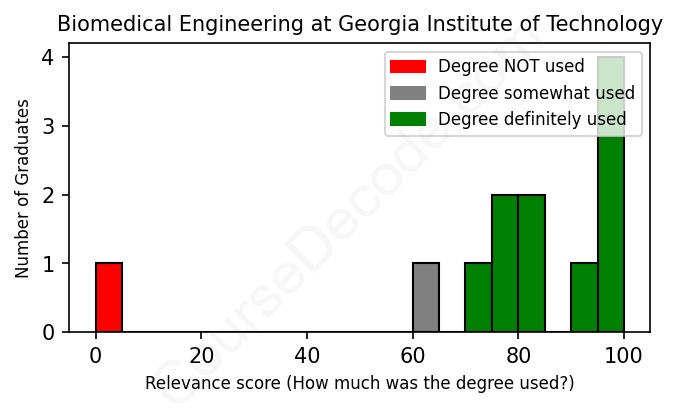
First, some facts. Of the Biomedical Engineering graduates from Georgia Institute of Technology we've analyzed , here's how many have used (or NOT used) their degree in their career:

These are estimates based on AI analysis of 12 LinkedIn profiles (see below).
The verdict? Significantly above average. Overall, with an average relevance score of 78%, Biomedical Engineering graduates from Georgia Institute of Technology have a much higher likelihood (+11%) of finding work in this field compared to the average graduate across all fields:
And for comparison, here's the chart for all profiles we've looked at across all degrees.
Also, after graduating, 58% of these graduates have pursued further education other than another Bachelor's degree (such as a Masters degree or other), compared to the average across all profiles of 35%. This suggests you may need more than just a Bachelors degree to be competitive as a Biomedical Engineering graduate.
See the details:
|
Relevance score: 94% We think this person has gone into a career highly relevant to their degree. We think this person has gone into a career highly relevant to their degree.
DEGREE INFOGraduated in 2012 from Georgia Institute of Technology with a Bachelors of Science in Biomedical Engineering. No other secondary education since. JOB HISTORY SINCE GRADUATIONSystem and Product Evaluation Engineer Abbott Jan 2013 - Jun 2013 Quality Assurance Program Specialist  Abbott Jul 2013 - Dec 2013 Manufacturing Engineer  Abbott Jan 2014 - Jun 2014 Manufacturing Supervisor  Abbott Jul 2014 - Dec 2014 R&D Engineer  Abbott Jan 2015 - Sep 2015 R&D Engineer  Abbott Sep 2015 - Jun 2017 Senior R&D Engineer  Abbott Jun 2017 - Mar 2020 Staff R&D Clinical Engineer  Abbott Mar 2020 - Jun 2021 Principal Scientist, Clinical Research  Abbott Jun 2021 - Present ABOUTBiomedical engineer with enthusiasm for connecting unmet clinical needs to novel medical device development. Strengths include working with physicians/hospital staff/KOLs, modeling clinically relevant anatomy and cardiovascular hemodynamics, human factors engineering, and pre-clinical applications. Experienced across multiple healthcare industries: structural heart repair, vascular solutions, diabetes care, diagnostics, and nutrition. |
The top 10 most common jobs done by the graduates we've analyzed (ranked most common to least) are:
When looking at the types of jobs held by graduates of Biomedical Engineering from Georgia Tech, a clear pattern emerges. Many of these professionals have taken on roles in research and development, particularly in healthcare and medical device companies like Abbott and Illumina. Positions such as R&D Engineers and Research Assistants stand out as they directly connect to the skills learned in their Biomedical Engineering degree. Working on things like developing medical devices or conducting research in clinical settings are highly relevant ways to apply their academic training.
However, not all positions clearly align with the field. Some graduates have ventured into roles like sales operations or administrative positions that don't require deep technical knowledge of biomedical engineering. While jobs like these may utilize some analytical skills or basic understanding of medical concepts, they largely stray from the core competencies of their degree. Overall, while there are plenty of relevant roles directly applying Biomedical Engineering principles, there are also a significant number of jobs that don’t leverage their technical skills to the fullest, showing a mixed bag of alignment with their academic background.
Here is a visual representation of the most common words in job titles for Biomedical Engineering graduates (this is across all Biomedical Engineering graduates we've analyzed, not just those who went to Georgia Institute of Technology):

Graduates with a Biomedical Engineering degree from Georgia Tech seem to have a pretty solid track record when it comes to finding relevant careers after they finish school. For many, their first job post-graduation tends to be in research or engineering roles, often at well-known companies in the healthcare or medical device sectors like Abbott, Illumina, and Kimberly-Clark. For instance, those graduating around 2012 to 2016 typically began their careers in roles such as R&D engineers, clinical specialists, or research assistants, which align closely with their academic training and skill set. These early positions serve as a great stepping stone into more advanced roles as they accumulate experience.
Fast forward five to ten years, and it looks like many of these graduates have moved up the ladder into more senior roles. Some transitioned to positions like principal scientists, senior project managers, and even leadership roles in clinical research or product management. This trajectory suggests that the skills and knowledge they gained at Georgia Tech are genuinely valuable in the workforce, leading to meaningful positions that are relevant to their studies. However, it's also clear that a few paths led to jobs that are a bit more removed from the core of Biomedical Engineering, especially in sales or unrelated operational roles. Overall, most graduates appear to have leveraged their degrees well, finding fulfilling careers within the scope of biomedical engineering and healthcare innovation.
Hey there! So, getting a Bachelor’s degree in Biomedical Engineering at Georgia Tech is no walk in the park. It’s a pretty rigorous program that mixes engineering principles with biology and medicine, which means you’ll be tackling a lot of tough math, science, and technical courses. The workload can be intense, with challenging projects and labs that require a solid commitment; it definitely demands good time management skills and a strong interest in the field. While some students find it manageable if they're really passionate about it, others can struggle a bit with the pace and complexity. Overall, I’d say it’s definitely on the harder side compared to many other majors, but if you’re into it, it can also be super rewarding!
Most commonly, in the LinkedIn profiles we've looked at, it takes people 4 years to finish a Bachelor degree in Biomedical Engineering.
Looking at these Biomedical Engineering grads from Georgia Tech, it seems like they’ve landed some pretty solid jobs over the years, mostly with big-name companies like Abbott and Illumina, which usually offer decent salaries and good career growth. Many have climbed the ranks quickly or taken on roles like “Principal Scientist” or “Director,” hinting they’re making pretty good money, especially as you get into those higher level positions. The work they’re doing, especially in research and development in a field like biomedicine, typically pays well because it’s so specialized. Of course, starting salaries can be a bit lower, especially for entry-level roles, but over time, it looks like they're doing alright. Overall, it seems like these grads are on a solid financial path!
Here is a visual representation of the most common words seen in the "about" section of LinkedIn profiles who have a Bachelor degree in Biomedical Engineering (this is across all Biomedical Engineering graduates we've analyzed, not just those who went to Georgia Institute of Technology). This may or may not be useful:

Here are all colleges offering a Bachelor degree in Biomedical Engineering (ordered by the average relevance score of their Biomedical Engineering graduates, best to worst) where we have analyzed at least 10 of their graduates:
| College | Score | Count |
|---|---|---|
 Georgia Institute of Technology Georgia Institute of Technology
|
78 | 12 |